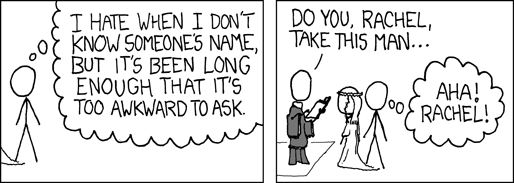
I’m envious of people with photographic memories. Wouldn’t it be great to be able to remember peoples names effortlessly!
But it doesn’t come naturally to me.
However, I do have a reputation for remembering peoples names.
What you don’t know is how hard I work at it.
Why do I work so hard?
2 reasons.
- First, because it’s so important! A persons name is the “sweetest sound in the world to them, in any language” (Dale Carnegie).
- Second, because I like people remembering my name. And the first step to achieve that is to remember their name first.
Over the years I’ve picked up a range of techniques from a number of books, articles, conversations that I’ve used to improve my ability to remember names.
That’s what I’m sharing with you today.
What you need to do is find a combination of a handful of techniques that suit you in particular.
The combination I use might be different to the combination you use because our brains are wired a little differently.
But first, here are 3 rules you need to agree to:
3 Rules That Will Make You Better At Remembering Peoples Names
Rule #1: Stop telling people that you are bad at remembering names
Is this something you do?
Eliminating this negative self-talk is the first step.
Everytime you say the sentence “I’m so bad at remembering names” to yourself, or out loud as an apology, you are reinforcing that perception of yourself and preventing yourself from improving.
That ends today.
I want you to promise me you won’t say that sentence again.
Read this out loud:
“I will not tell people, or myself, that I’m bad at remembering names again”.
Good.
From now on use this sentence instead: “I’m getting better at remembering peoples names”.
After a few days of using this technique and the ones below, you can then switch to this sentence:
“I am good at remembering people’s names”.
Done? Good.
Rule #2: Decide to make an effort to remember peoples names
Let’s be honest, you’ve been a bit lazy until now.
You’ve blamed your “bad memory” and haven’t really applied yourself, have you?
That changes today too.
Make this commitment with me:
From now on, just before you walk into a room of new people you are about to meet, say this to yourself:
“I will make my best effort to remember names of the people I meet”.
Done? Good.
Rule #3: Concentrate
If you are distracted or if you aren’t paying attention, you won’t register the person’s name so you that will make it hard to remember.
Concentrate on paying attention to the person’s name when you first hear it.
Say this with me:
“I’m going to concentrate because remembering people’s names is important and valuable”
Done? Good.
Next, here are the 10 ways to memorise a persons name.
10 Ways To Memorise A Persons Name
(Hint: Repetition is a key part).
You’ve just walked into a room.
There is someone you haven’t met before. Yay!
You walk up to them and hold out your hand.
You say “Hi, I’m your_name, what’s your name?”
Here are 10 ways to burn their name into your memory:
#1. Ask them to repeat their name immediately
- They say “John.”
- You say “John?”
- They nod and say “John, yes.”
- You say “John!”
- They say “Yes!”
#2. Ask them to spell their name if it’s tricky
- Ask them to repeat it if it’s tricky, or in another language until you get the pronunciation perfect
- They won’t mind, they like helping people get it right, they are proud that their name is unusual
#3. Use their name immediately with your first question
- “So what’s your story John?” is how I start every conversation
#4. As they speak, repeat their name silently to yourself
- Tag their name onto everything they are telling you (not out loud): “Is that right John?”, “Interesting John”, “You live in this city John”…
#5. Use their name occasionally in the conversation (without overdoing it)
- Every time you do, their mind will light up like a Christmas tree (one day I’ll hire an MRI scanner and prove it to you)
- You become very important to them because they feel important and valuable
- They become determined to remember your name and they value you too
#6. If you suddenly forget their name half-way through the conversation speak up immediately
- Sure, it’s a little bit embarrassing, but it’s perfectly fine to ask
- “I’m sorry, your name has just popped out of my head, what is it again?”
#7. If you forget their name again, then ask for their full-name
- That’s a sneaky way to ask them without looking forgetful
- This way, you are asking for their surname, but you get to hear their first name as a bonus. I use this trick all the time 🙂
#8. Do you want to keep in contact with them?
- Awww you made a new friend, I’m so proud of you!
- If you’ve forgotten their name again, ask them to type their details into your phone (another trick!)
- If you do remember, input their contact details into your phone yourself
- Next, send them a text message with your name in it
- That gives you a timestamp so if you forget their name later, you can look through your txt’s for that day and see their name
- If you don’t save their contact details into your phone, at least write down their name into the notes app on your phone or into your notebook
#9. Use their name as you say goodbye
- “Great to meet you John!”
#10. When you get back to your desk, connect with them on LinkedIn and Facebook
- Searching for them gets you to use their name again and seeing their profile photo associates their name with their face
Beware Of Asking For Their Business Card As A Shortcut
Human brains are lazy.
Did you know your brain uses 20% of your bodies energy?
Your brain is always looking for ways to conserve energy.
- With a business card your brain will not work so hard to remember their name
- Your brain will say to you “don’t worry about it, we can just look at the card later!”
- But at that moment in the future when you need the card, it will be miles away in a drawer
Avoid the most common mistake: Don’t give out your business card without taking one back
- If you make this mistake they will have your contact details in their pocket but you’ll have nothing!
- Most often they won’t take any action with the card so you won’t hear from them again and you’ve lost your chance to keep in touch
Having said that, taking their business card can be useful because if you are about to bump into them at the same venue later, you can fish it out of your pocket and remind yourself of their name.
What About Meeting People One-After-Another In Rapid-Fire?
The good news is that expectations are much lower, no-one expects you to remember their name if they are just one of many people that you are meeting at once.
You might get a chance to meet several of them one-on-one later on, so in those cases you can just start the process above as normal.
A sit down meeting is easier. Here’s how to do it:
- Once you’ve met everyone, take your seat and write down as many of the names as you can remember
- During the meeting, people often use each others names, so write down the news ones as you hear them
- If you’re lucky, the meeting starts with introductions, so that’s your chance to write everybodies name down
- I often draw the shape of the table and write the name of everyone in order from left to right
- As each person talks during the meeting, say their name to yourself like in tip #4 above
If I’m running the meeting I like to amaze everyone (and challenge myself) by saying thank you to everyone at the meeting from left to right saying everyone’s name (only possible because I’ve been working so hard on their names the whole way through the meeting).
I might pause on 1 person but they always come to the rescue by saying their name, but it’s pretty impressive and no-one at the meeting can forget my name after that stunt (which is 1 of my objectives in the first place).
A Technique That Has Never Worked For Me: Name Association
That’s when you look at their face and think about who they remind you of, like a famous actor, and you try and match their name with the famous actor somehow. Or they might have arched eyebrows and their name is Archie so you mash those together in your head.
I’ve tried this technique a few times but it doesn’t work for me.
It uses too much processing power when I’m trying to listen to what they are saying to me, and the associations just don’t seem to stick for me.
Your Thoughts?
How did you find this list? Useful? Any tips missing that you use? Have your say in the comments section below.
